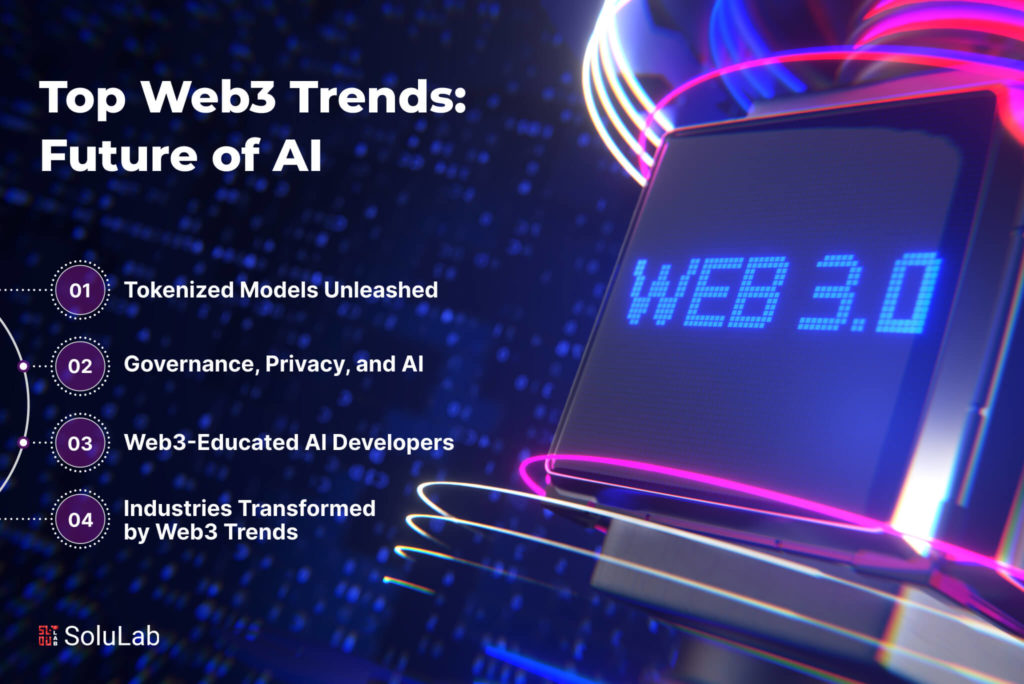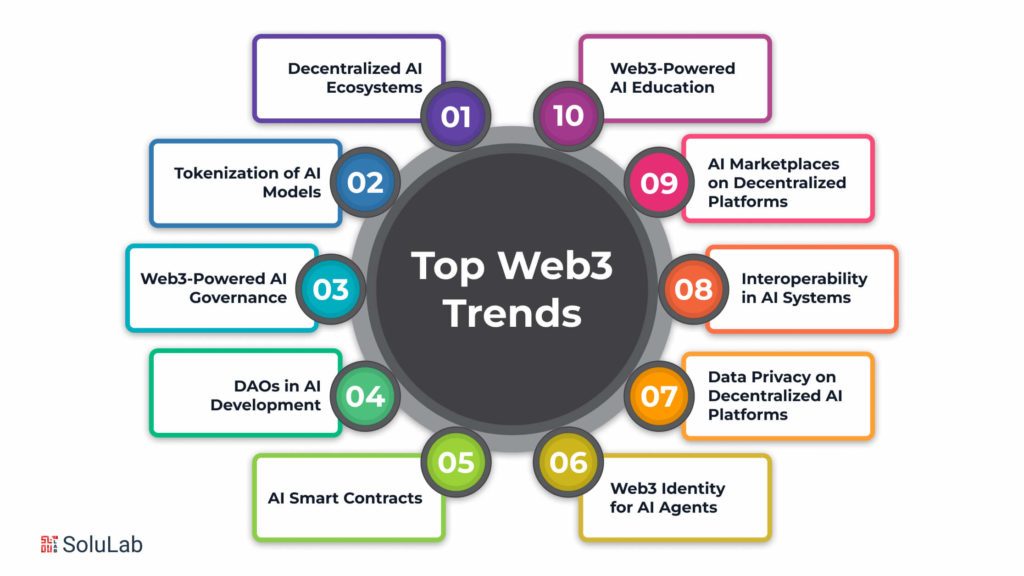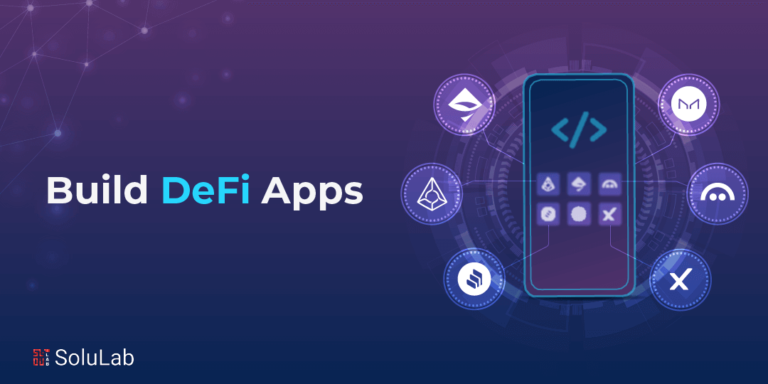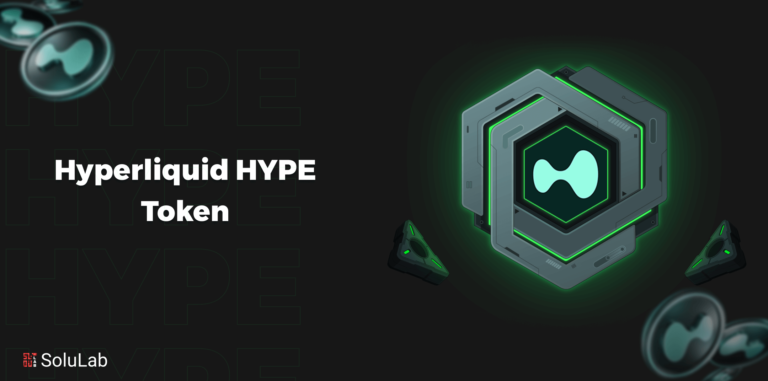
In the dynamic landscape of technological evolution, understanding the top Web3 trends for 2024 is crucial. As we delve into the intersection of Web3 and artificial intelligence (AI), we uncover transformative trends shaping the future of technology.
One of the most significant trends is the growth of decentralized finance (DeFi). DeFi is a financial system that is built on blockchain technology and does not rely on centralized institutions like banks. This has the potential to disrupt the traditional financial system and make financial services more accessible and affordable for everyone.
Another major trend is the rise of non-fungible tokens (NFTs). NFTs are digital assets that are unique and cannot be replaced. They have been used to create digital art, collectibles, and even real estate. NFTs are still in their early stages, but they have the potential to revolutionize the way we own and trade digital assets.
The growth of Web3 is also being driven by the development of new technologies, such as AI and machine learning. AI can be used to improve the security of blockchains, create new DeFi applications, and power NFTs. Machine learning can be used to analyze data and make predictions, which can be used to improve the performance of DeFi protocols and NFT marketplaces.
The intersection of Web3 and AI is creating new opportunities for innovation and disruption. These trends are just a few of the ways that Web3 is changing the world. As technology continues to evolve, we can expect to see even more exciting developments in the years to come.
The Evolving Landscape of Web3
-
Defining Web3 Trends
Web3 trends represent the next wave of technological advancements, characterized by decentralized structures and enhanced user control. The evolution of Web3 is relentless, driving innovation across various industries.
One of the most significant trends in Web3 is the rise of decentralized finance (DeFi). DeFi platforms allow users to conduct financial transactions without the need for a central authority, such as a bank or government. This has the potential to revolutionize the financial system, making it more accessible and efficient.
Another major trend in Web3 is the growth of the metaverse. The metaverse is a virtual world where users can interact with each other and with digital objects. This has the potential to create new forms of entertainment, education, and commerce.
Web3 is also driving innovation in the gaming industry. Blockchain-based games allow players to own their in-game assets, which can be traded or sold. This has the potential to create a more equitable and sustainable gaming economy.
Web3 is still in its early stages, but it has the potential to transform the way we interact with the world. Decentralized structures and enhanced user control have the potential to create a more open, transparent, and equitable future.
-
The Interplay with AI
The interplay between Web3 and AI signifies a symbiotic relationship. Web3 platforms, such as decentralization and transparency, are redefining how AI processes operate. This integration is poised to reshape the AI landscape in profound ways.
Web3 is a new paradigm for the internet that is built on blockchain technology. It promises to be more decentralized, secure, and transparent than the current web. AI is a powerful technology that can be used to automate tasks, make predictions, and create new insights. When combined with Web3, AI can be used to create new and innovative applications that have the potential to change the world.
One of the most significant ways that Web3 is impacting AI is by making it more decentralized. In the traditional web, AI models are typically trained and hosted on centralized servers. This can create a single point of failure, which can make the models vulnerable to attack. With Web3, AI models can be trained and hosted on a decentralized network of nodes. This makes the models more secure and resilient.
Another way that Web3 is impacting AI is by making it more transparent. In the traditional web, AI models are often black boxes. This means that it is difficult to understand how the models make decisions. With Web3, AI models can be built on open-source software, which makes it possible for anyone to inspect the code and understand how the models work. This increased transparency can help to build trust in AI and make it more accessible to a wider range of users.
The integration of Web3 and AI is still in its early stages, but it has the potential to reshape the AI landscape in profound ways. By making AI more decentralized and transparent, Web3 can help to create new and innovative applications that have the potential to change the world.
Top Web3 Trends for 2024

Decentralized AI Ecosystems
In 2024, we anticipate the rise of decentralized AI ecosystems. This trend will decentralize AI processes, enhancing scalability, ensuring privacy, and democratizing access to AI technologies. The shift towards decentralized ecosystems promises a more inclusive AI landscape.
Decentralized AI ecosystems are networks of AI-powered devices and applications that are not controlled by a single entity. This decentralization has several benefits, including:
- Scalability: Decentralized AI ecosystems can scale more easily than centralized systems, as they do not rely on a single point of failure. This makes them more resilient to cyberattacks and other disruptions.
- Privacy: Decentralized AI ecosystems can protect user privacy more effectively than centralized systems, as data is not stored in a single location. This is important for applications such as healthcare and finance, where user privacy is paramount.
- Democratization: Decentralized AI ecosystems make it easier for people to access and use AI technologies. This is because they do not require users to have specialized knowledge or equipment. This democratization of AI has the potential to create new opportunities for innovation and economic growth.
The shift towards decentralized AI ecosystems is still in its early stages, but it is gaining momentum. As the technology matures, we expect to see more and more decentralized AI ecosystems being deployed. This will have a significant impact on the way we use AI, making it more scalable, secure, and accessible.
Tokenization of AI Models
The tokenization of AI models is a rapidly growing trend that is expected to have a significant impact on the way AI is developed and used. In 2024, we foresee the rise of tokenized AI models on decentralized platforms. This trend will not only facilitate accessibility to AI but also incentivize developers, creating a more dynamic AI development landscape.
There are a number of reasons why tokenization is becoming increasingly popular for gen AI models. First, it allows for greater flexibility and scalability. AI models can be tokenized and traded on decentralized platforms, making them more accessible to a wider range of users. This can help to democratize AI and make it more accessible to businesses and individuals who may not have the resources to develop their own AI models.
Second, tokenization can help to incentivize developers to create better AI models. By allowing developers to earn rewards for their work, tokenization can create a more competitive and dynamic AI development landscape. This can lead to the development of more innovative and effective AI models.
Finally, tokenization can help to improve the security of AI models. By making AI models more transparent and traceable, tokenization can help to protect against fraud and abuse. This can make AI models more trustworthy and reliable for businesses and individuals who use them.
Overall, we believe that the tokenization of AI models is a positive trend that has the potential to make AI more accessible, innovative, and secure. We expect to see continued growth in this area in the coming years.
Web3-Powered AI Governance
Decentralized governance models for AI decision-making are becoming prominent as a way to ensure ethical and transparent practices. Web3-powered AI governance is one such model that uses blockchain technology to create a tamper-proof record of AI decisions. This can help to mitigate concerns about biased or unethical AI decision outcomes, as it makes it possible to track and audit the decisions that are made.
There are a number of benefits to using decentralized governance models for AI decision-making. First, they can help to improve the transparency of AI decision-making processes. By creating a public record of AI decisions, it is possible for stakeholders to see how decisions are made and to identify any potential biases or ethical concerns. Second, decentralized governance models can help to improve the accountability of AI decision-makers. By making it possible to trace decisions back to the individuals who made them, it is possible to hold those individuals accountable for their decisions. Third, decentralized governance models can help to improve the robustness of AI decision-making processes. By making it possible to audit AI decisions, it is possible to identify and correct any errors or biases in the decision-making process.
Despite the benefits, there are also some challenges associated with using decentralized governance models for AI decision-making. One challenge is that they can be complex and difficult to implement. Another challenge is that they can be costly to operate. Finally, decentralized governance models can be vulnerable to cyberattacks.
Overall, decentralized governance models for AI decision-making offer a number of potential benefits, including improved transparency, accountability, and robustness. However, there are also some challenges associated with these models, such as complexity, cost, and vulnerability to cyberattacks.
DAOs in AI Development
The integration of Decentralized Autonomous Organizations (DAOs) in AI development is gaining momentum. DAOs streamline collaborative AI projects, providing a decentralized framework for decision-making and resource allocation.
DAOs are organizations that are governed by a set of rules that are encoded by AI in a blockchain. This means that they are not subject to the same bureaucratic and hierarchical structures as traditional organizations. This makes them ideal for collaborative AI projects, which often involve a large number of stakeholders with different interests.
DAOs provide a decentralized framework for decision-making and resource allocation. This means that decisions are made by the community of stakeholders, rather than by a central authority. This can help to ensure that decisions are made in a transparent and democratic manner. Additionally, DAOs allow for more efficient resource allocation, as decisions can be made quickly and without the need for lengthy approval processes.
The integration of DAOs in AI development is still in its early stages, but there are already a number of projects that are using DAOs to great effect. For example, the AI-powered prediction market DeepDAO uses a DAO to manage its treasury and make decisions about how to invest its funds. Additionally, the AI research platform OpenAI uses a DAO to govern its research agenda and make decisions about how to allocate its resources.
As DAOs continue to develop, they are likely to play an increasingly important role in AI development. They offer a number of advantages over traditional organizations, including greater efficiency, transparency, and democracy. This makes them ideal for collaborative AI projects, which are becoming increasingly complex and require a high degree of coordination.
AI Smart Contracts
The use of smart contracts for automating AI processes is a growing trend. In 2024, we anticipate increased adoption of AI smart contracts, enhancing transparency and trust in AI transactions while automating complex processes.
Smart contracts are computer programs that are stored on a blockchain and automatically execute when certain conditions are met. This can be used to automate a wide range of AI processes, such as:
- Determining the price of a product or service based on real-time data
- Executing trades in financial markets
- Managing supply chains
- Enforcing compliance with regulations
The use of AI smart contracts can provide a number of benefits, including:
- Increased efficiency: AI smart contracts can automate tasks that would otherwise be time-consuming and error-prone.
- Reduced costs: AI smart contracts can eliminate the need for human intervention, which can save businesses money.
- Improved accuracy: AI smart contracts can be programmed to take into account a wider range of factors than human decision-makers, which can lead to more accurate results.
- Enhanced transparency: AI smart contracts are transparent, which can help to build trust between businesses and their customers.
However, there are also some challenges associated with the use of AI smart contracts, such as:
- Security: AI smart contracts are vulnerable to cyberattacks, which could lead to financial losses or data breaches.
- Complexity: AI smart contracts can be complex, which can make them difficult to understand and audit.
- Legal uncertainty: The legal status of AI smart contracts is still evolving, which can create uncertainty for businesses.
Despite these challenges, the use of AI smart contracts is expected to grow in the coming years. As businesses become more comfortable with the technology, they will increasingly look to AI smart contracts to automate their processes and improve their efficiency.
Web3 Identity for AI Agents
Ensuring secure identities for AI agents is crucial, and Web3 is contributing to this trend. The use of decentralized identity solutions enhances the security and privacy of AI entities, fostering trust in AI interactions.
Decentralized identity solutions provide a number of benefits for AI agents, including:
- Increased security: Decentralized identity solutions are more secure than traditional centralized identity solutions, as they are not subject to a single point of failure. This makes them less vulnerable to cyberattacks.
- Enhanced privacy: Decentralized identity solutions give users more control over their personal data, as they allow users to choose which data they share with which entities. This can help to protect users from data breaches and identity theft.
- Fostered trust: Decentralized identity solutions can help to foster trust in AI interactions by making it easier for users to verify the authenticity of AI agents. This can help to reduce the risk of users being tricked by malicious AI agents.
As the use of AI continues to grow, the need for secure and privacy-preserving identity solutions will become increasingly important. Decentralized identity solutions are well-positioned to meet this need, and Web3 is helping to make these solutions more accessible and affordable.
Data Privacy on Decentralized AI Platforms
Web3 is playing a pivotal role in addressing data privacy concerns in AI. Decentralized solutions for ensuring data privacy in AI operations contribute to building trust and compliance in data usage.
Web3 is a new paradigm for the internet that is based on blockchain development solutions. Blockchain is a distributed ledger that records transactions in a secure and tamper-proof way. This makes it ideal for storing sensitive data, such as personal information or financial data.
AI is a powerful technology that can be used to automate tasks and make predictions. However, AI systems can also be used to collect and analyze large amounts of data, which can raise privacy concerns. Decentralized solutions for ensuring data privacy in AI operations can help to address these concerns by giving users more control over their data.
For example, a decentralized AI platform could allow users to choose which data they share with the platform, and how that data is used. The platform could also use encryption to protect data from unauthorized access. These measures can help to build trust and compliance in data usage, which is essential for the adoption of AI in a wide range of industries.
Web3 is still in its early stages, but it has the potential to revolutionize the way we use AI. By providing decentralized solutions for ensuring data privacy, Web3 can help to make AI more secure and trustworthy. This will open up new opportunities for AI to be used in a wide range of applications, from healthcare to finance to transportation.
Interoperability in AI Systems
Interoperability among AI systems is a key trend facilitated by Web3. The ability of AI systems to seamlessly collaborate and exchange data within a decentralized ecosystem is poised to enhance overall efficiency and innovation.
One of the biggest challenges facing AI today is the lack of interoperability between different AI systems. This makes it difficult to share data and insights between systems, which can limit the overall effectiveness of AI applications. Web3, with its focus on decentralization and open data, has the potential to address this challenge.
By creating a decentralized ecosystem where AI systems can interact with each other directly, Web3 can make it much easier for AI systems to share data and insights. This will allow AI systems to learn from each other and become more intelligent, which can lead to new and innovative applications.
For example, a healthcare AI system could use data from a financial AI system to better understand the financial impact of a patient’s condition. Or, a transportation AI system could use data from a weather AI system to better plan routes around bad weather conditions. The possibilities are endless.
The interoperability of AI systems is a critical step towards the realization of the full potential of AI. Web3, with its focus on decentralization and open data, has the potential to make this a reality.
AI Marketplaces on Decentralized Platforms
Decentralized marketplaces for AI services are on the rise, as they offer a number of advantages over traditional, centralized platforms. These platforms, enabled by Web3, open avenues for a broader range of AI applications and solutions, fostering a more dynamic and collaborative AI marketplace.
Here are some of the benefits of decentralized AI marketplaces:
- Increased interoperability: Decentralized marketplaces allow for the seamless exchange of AI services and data between different platforms and organizations. This can help to break down silos and create a more unified AI ecosystem.
- Improved security: Decentralized marketplaces are more secure than traditional platforms, as they do not rely on a single point of failure. This makes them less vulnerable to cyberattacks and data breaches.
- Greater transparency: Decentralized marketplaces provide greater transparency into the AI services that are being offered. This can help to build trust between buyers and sellers and ensure that users are getting the best possible value for their money.
- Lower costs: Decentralized marketplaces can help to lower the costs of AI services by reducing the need for intermediaries. This can make AI more accessible to businesses and organizations of all sizes.
As the AI industry continues to grow, decentralized marketplaces are likely to play an increasingly important role. They offer a number of advantages over traditional platforms, and they can help to make AI more accessible, secure, and transparent.
Web3-Powered AI Education
In 2024, decentralized education platforms for AI are gaining prominence. These platforms, powered by Web3, empower a global community of AI learners and developers, fostering knowledge-sharing and skill development.
One of the key benefits of decentralized education platforms is that they offer a more democratized learning experience. In traditional educational settings, students are often limited to the curriculum and resources that are provided by their institution. With decentralized platforms, students have access to a wider range of learning materials and opportunities, which can help them to develop the skills they need to succeed in the AI field.
Another advantage of decentralized education platforms is that they are more flexible and adaptable. Students can learn at their own pace and on their own terms, and they can access courses and materials from anywhere in the world. This makes decentralized platforms a great option for busy professionals or those who live in remote areas.
Finally, decentralized education platforms are more secure than traditional educational institutions. Because they are not controlled by a single entity, they are less vulnerable to cyberattacks and data breaches. This makes them a safer option for students who are concerned about the security of their personal information.
As the AI field continues to grow, decentralized education platforms will become increasingly important. They offer a more democratized, flexible, and secure learning experience that can help students to develop the skills they need to succeed in this rapidly evolving field.
The Implications and Future Impact
Transformative Impact on AI Industries
The collective impact of these top Web3 development trends extends beyond technological advancements. Industries relying on AI technologies are set to undergo transformative changes, with innovative applications and enhanced operational efficiency. For example, the healthcare industry is poised to benefit from the development of AI-powered medical devices and treatments. These technologies can help doctors diagnose diseases more accurately, provide personalized treatment plans, and even automate some routine tasks. The financial services industry is also expected to see significant changes, as AI-powered robo-advisors become more sophisticated and offer a wider range of services. These tools can help investors make more informed decisions and manage their portfolios more effectively.
In addition to these specific industries, Web3 technologies have the potential to disrupt a wide range of other sectors, including retail, manufacturing, and transportation. As these technologies continue to develop, we can expect to see even more innovative applications and even greater operational efficiency across all industries.
Challenges and Considerations
While the future of Web3 and AI integration looks promising, there are a number of challenges that need to be addressed in order to ensure a seamless integration. These challenges include
- Regulatory considerations: Web3 and AI are both rapidly evolving fields, and it is important to ensure that they are developed in a way that is compliant with existing regulations. This includes regulations related to data privacy, security, and consumer protection.
- Scalability challenges: Web3 and AI are both very data-intensive, and it is important to ensure that they can scale to handle the vast amounts of data that will be generated in the future. This will require developing new and innovative ways to store and process data.
- Ethical considerations: Web3 and AI have the potential to be used for good or for evil, and it is important to ensure that they are developed in a way that is ethical and responsible. This includes considering the potential for bias and discrimination, and ensuring that users have control over their data.
By carefully addressing these challenges, we can ensure that Web3 and AI integration is a success and that it has a positive impact on society.
Conclusion
The top Web3 trends for 2024 are poised to redefine the landscape of artificial intelligence, shaping a future where decentralization, transparency, and collaboration are paramount.
SoluLab is a leader in Web3 development solutions, offering top-notch services that align seamlessly with emerging trends. As the demand for Web3 services and expertise continues to surge, SoluLab stands as a strategic partner for businesses seeking to harness the full potential of decentralized technologies.
FAQs
1. Why is Web3 development crucial for the future of AI?
Web3 development introduces decentralization and transparency, fostering an environment that aligns with the principles of AI ethics. This synergy enhances the trustworthiness and scalability of AI systems.
2. How can businesses leverage the top Web3 trends for AI in 2024?
Businesses can integrate decentralized AI ecosystems, explore the tokenization of AI models, and embrace AI smart contracts. Partnering with a Web3 development company like SoluLab can facilitate a seamless transition.
3. What challenges may arise in adopting Web3 trends for AI applications?
Challenges include regulatory considerations, interoperability issues, and the need to address ethical concerns in decentralized AI governance. Navigating these challenges requires strategic planning and expertise.
4. What role does SoluLab play in the Web3 and AI landscape?
SoluLab is a leading Web3 development company offering a comprehensive suite of services. Their expertise in Web3 development and a team of skilled web3 developers position them as key partners for businesses seeking to embrace these trends.
5. Can Web3-powered AI education impact the global AI learning community?
Yes, decentralized education platforms for AI, a trend for 2024, have the potential to empower a global community of AI learners and developers. This inclusive approach fosters knowledge-sharing and skill development.
6. How do tokenized AI models benefit developers and users alike?
Tokenized AI models incentivize developers by introducing a token-based reward system. Users, on the other hand, gain access to a wider range of AI applications and services in a decentralized marketplace.
7. Are there any specific industries expected to benefit most from these trends?
Industries reliant on AI, such as healthcare, finance, and logistics, are poised to benefit significantly. The transformative impact of Web3 trends extends across sectors, enhancing operational efficiency and innovation.






